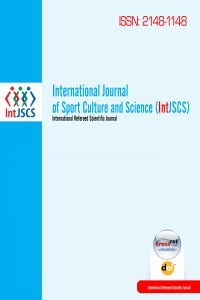Attitudes of the Students at Physical Education (PE) Teaching and Sports Department towards Technology Use in Education
The aim of present study is to investigate the attitudes of the students at physical education
teaching (PETD) and sport department (SD) with different demographic characteristics
towards the use of technological tools and devices in education (UTTD).The study was
carried out over totally 446 subject students (154 females and 292 males) attending PETSD at
Atatürk University in the spring semester of 2015-2016educational term. In the scope of the
study, students were applied technology attitude scale (TAS) developed by Yavuz
(2005).Data were analysed using SPSS 21 software package. Frequency distribution was used
in the determination of demographic characteristics, t test in the investigation of the
relationship between two independent variables and attitudes towards UTTD and Anova
Variance analysis test in the determination of the relationship between variables more than
two and attitudes towards UTTD. Difference between the variables was interpreted at p.0,05
significance level. It was stated from the results that there was a statistical significant
difference between the attitude of students towards technology use (ASTTU) and the
variables of the type of program they attend, age, department and grade while no difference
was found for gender. It was seen that 4th grade students had higher ASTTU than that of
those at the 1st and 2nd grades. It was seen when considered the variable of age that ASTTU
was higher among those ≥26 than 20-22. When the departments of students were taken into
consideration, ASTTU was found to be higher among the PET students than that of SD.
According to the program type, ASTTU among the students at the daytime education was
higher than that of those at the night time education. It may be suggested in order to increase
the interest of students towards UTTD during educational processto maximum that teachers
should use technology more effectively and certificated training should be given to teachers
inefficient in technology use and such education should be added in the curricula of different
departments.
Keywords:
Technology, attitude, Physical Education, sport,
___
- Barut L (2015).Fen Ve Teknoloji Öğretmenlerinin Eğitimde Teknoloji Kullanımına Yönelik Tutumları ile Bilgisayar Öz Yeterlik Algıları Arasındaki İlişki, Kahramanmaraş Sütçü imam Üniversitesi, Fen Bilimleri Enstitüsü, Kahramanmaraş.
- Dalton DW, Hannafin MJ (1986). The Effects of Video-Only, CAI Only and Interactive Video Instructional Systems on Learner Performance and Attitude. An Exploratory, U.S.,Indıana 1986-01-00.
- Gunter G, Gunter RE, Wiens GA (1998). Teaching Pre-Service Techers Technology: Papor Presented at The Site 98, Society for Information Technology and Teacher Education International Conference.
- Özgen K, Obay M (2008). Orta Öğretim Matematik Öğretmen Adaylarının Eğitim Teknolojisine Ilişkin Tutumları. http://ietc2008.home.anadolu.edu.tr/ietc2008/108.doc.
- Sadık R (1999). Öğretmen Olmak. Güldiken Yayınları, Ankara.
- Sevindik T (2006). “Akıllı Sınıfların Yükseköğretim Öğrencilerinin Akademik Başarı ve Tutumlarına Etkisi”, Yayımlanmamış Doktora Tezi, Fırat Üniversitesi.
- Solak M (2009),İlköğretimde Görev Yapan Branş Öğretmenlerinin Eğitimde Teknoloji Kullanımına Ilişkin Görüşleri,Atatürk Üniversitesi / Fen Bilimleri Enstitüsü / Bilgisayar ve Öğretim Teknolojileri Eğitimi Anabilim Dalı, Erzurum.
- Şimşek Ü (2015). Sosyal Bilgiler Öğretmen Adaylarının Eğitimde Teknoloji Kullanımına Ilişkin Tutum Ve Görüşlerinin Incelenmesi, Aksaray Üniversitesi / Sosyal Bilimler Enstitüsü / İlköğretim Anabilim Dalı/Sosyal Bilgiler Eğitimi Bilim Dalı, Aksaray.
- Varol N (1997). Bilgisayar Destekli Eğitim, Türk Cumhuriyetleri ve Asya Pasifik Ülkeleri Uluslararası Eğitim Sempozyumu, Elazığ, S: 138-145
- Yavuz S (2005). Developing a Technology Attitude Scale for Pre-Service Chemistry Teachers. The Turkish Online Journal of Educational Technology – TOJET, 4, 1, 17-25. 10.10.2006 tarihinde http://www.tojet.net/articles/412.doc.
- Yavuz S, Coşkun AE (2008). Sınıf Öğretmenliği Öğrencilerinin Eğitimde Teknoloji Kullanımına Ilişkin Tutum ve Düşünceleri, Hacettepe Üniversitesi Eğitim Fakültesi Dergisi. 34, 274-286.
- Yavuz S, Coşkun AE (2010). Ahi Evran Üniversitesi Eğitim Fakültesi Dergisi, Cilt 11,Sayı 1, s.105-118.
- Yılmaz M (2005). “İlköğretim 7.Sınıflarda Simetri Konusunun Öğretimde Eğitim Teknolojilerinin Başarı Ve Tutuma Etkileri, Yayımlanmamış Yüksek Lisans Tezi”, Marmara Üniversitesi, İstanbul.
- Yılmaz İ (2006). Eğitim Fakültesinde Eğitim Görmekte Olan Öğretmen Adaylarının Bilgisayar ve İnternet Kullanımına Yönelik Tutumlarının Belirlenmesi. Yayınlanmamış Yüksek Lisans Tezi, Celal Bayar Ü. SBE, Manisa.
- Yılmaz İ (2007). Öğretmen Adaylarının Çeşitli Değişkenler Açısından Bilgisayar Kullanımına Yönelik Tutumlarının Incelenmesi, 4.Uluslararası Akdeniz Spor Bilimleri Kongresi, 9–11 Kasım, Akdeniz Üniversitesi, Antalya.
- Yılmaz M (2007). Sınıf Öğretmeni Yetiştirmede Teknoloji Eğitimi, Gazi Üniversitesi Gazi Eğitim Fakültesi Dergisi,27(1). Kaya, Z. 2002. Uzaktan Eğitim. Pegem Yayıncılık. Ankara.
- Yılmaz İ (2008). Beden Eğitimi ve Spor Öğretim Elemanlarının Teknolojiye Ilişkin Tutumlarının Değerlendirilmesi, Türkiye Sosyal Araştırmalar Dergisi. 12(1), s.135–147.
- Yılmaz İ (2008). Beden Eğitimi Öğretmen Adaylarının Çeşitli Değişkenler Açısından Internet Kullanımına Yönelik Tutumlarının Incelenmesi, Atatürk Üniversitesi Beden Eğitimi ve Spor Bilimleri Dergisi.2008(3), s.31-38.
- Yılmaz İ (2010).Beden Eğitimi Öğretmenliği Programında Öğrenim Gören Öğrencilerin Eğitimde Teknoloji Kullanımına İlişkin Tutum ve Düşünceleri,Ahi Evran Üniversitesi Eğitim Fakültesi Dergisi, Cilt 11,Sayı 1, s. 105-118, Kırşehir.
- Yılmaz H (2012). Öğretmenlerin Eğitimde Teknoloji Kullanımı Konusunda Tutumlarının Değerlendirilmesi (Şişli Endüstri Meslek Lisesi örneği), Bahçeşehir Üniversitesi / Fen Bilimleri Enstitüsü / Bilgi Teknolojileri Anabilim Dalı, İstanbul.
- ISSN: 2148-1148
- Başlangıç: 2013
- Yayıncı: Uluslararası Bilim Kültür ve Spor Derneği (UBİKS)
